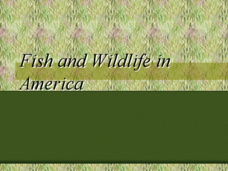Curated OER
ACTIVITY 6: MAKE A FOSSIL MOLD AND CAST and ACTIVITY 7: HOW BIG WERE PREHISTORIC ANIMALS?
Instructions for two terrific ancient history lessons for your primary paleontologists are provided in this resource. The first involves the creation of fossil cast replicas using plaster of Paris. The directions are detailed, but the...
Curated OER
Hatched From An Egg
Students discover how animals are born/hatched. In this life science lesson, students listen to a book entitled Chickens Aren't The Only Ones, and discuss animals that are hatched or born. Students receive a picture of an animal,...
Curated OER
Mud Fossils
Young scholars create their own fossils in an activity using plaster of paris and a variety of objects which can be fossils, e.g. chicken bones, twigs, shells, etc. After making their fossils, they allow them to dry and discuss time and...
Curated OER
Fish and Wildlife in America
Some of the details of the use of wildlife as food and crop resources are given at the beginning of this slideshow. Next, the historical problems with wildlife are explained, as are some mistakes that have been made leading to extinction...
Curated OER
Immune, Lymphatic System
A fantastic slideshow that has images, details, definitions and trivia to accompany each structure and response involved with the immune system. The slides are very useful for all levels of the immune response. A complete sets of notes...
Curated OER
Body Tissue
Human anatomy learners will grow more knowledgable about body tissue by viewing this presentation. Injected with a little humor (e.g. using a toilet paper roll graphic in place of the word "tissue"), it is sure to keep them engaged....
Curated OER
Viruses and Bacteria
In this viruses and bacteria worksheet, students will read information comparing the characteristics of bacteria and viruses. Then students will match 8 statements as either describing a virus or a bacteria.
Curated OER
Discovering Owls
Students are introduced to different types of owls and owl pellets. They list several adaptations that benefit the owls. Students identify the various species of owl that live in Wisconsin. Students discuss owl pellets and identify the...
Curated OER
Theme: Dinosaurs
Students identify at least ten different dinosaurs and name them. Students explain the difference between plant-eating dinosaurs and meat-eating dinosaurs. Students explain how scientists know about dinosaurs.
Curated OER
Turtles
Students discuss turtles. They read books about turtles, make turtle puppets, research turtles on the Internet and then create a turtle fact booklet.
Curated OER
S-O-I-L Soil
Fifth graders research soil, its nutrients, and plant growth. In this soil lesson plan, 5th graders create soil journals, trace flowers, and include nutrient information on each petal. Students read an excerpt from "McBroom Tells the...
Agriculture in the Classroom
National Agricultural Literacy Curriculum: From Chicken Little to Chicken Big
Students will identify different breeds of chickens, examine physical characteristics, and determine the stages of a chicken's life cycle.
American Museum of Natural History
American Museum of Natural History: Paleont O Logy: The Big Dig
This colorful and inviting resource houses tons of paleontology activities to explore. Play the Layers of Time puzzle game, create your own make-believe dig site by burying chicken bones in plaster of Paris, learn how to draw dinosaurs,...
Environmental Education for Kids
Eek!: Habitats: Prairie
Learn what prairies are, about the plants and wildlife that live there, and about the environmental efforts being made to restore them.
US Environmental Protection Agency
Epa: Endangered Species: Save Our Species Coloring Book
Use this site to create your own picture book of 21 endangered species. As you color each of the pages you can learn about each endangered animals.














